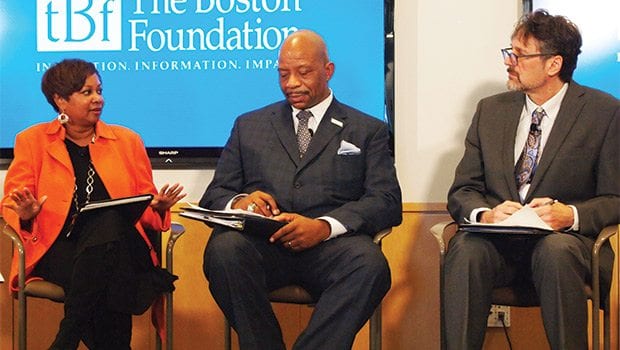New year, new visions for education
Panel airs ideas to boost college completion

Education leaders sat down at The Boston Foundation last week to discuss how best to boost college graduation rates.
Higher education increasingly is important in the post-recession employment landscape, noted Elizabeth Pauley, TBF senior director of Education to Career. While the BPS has seen signs of progress in its high schoolers’ college completion rates, much remains to be done, said Paul Grogan, TBF president and CEO. Fifty-one percent of college enrollees from the BPS class of 2009 earned a degree within six years, a 10 percent jump over the 2000 cohort. But that still leaves 49 percent not achieving postsecondary credentials in that time frame, he noted.
Gathered to discuss the way forward were Tommy Chang, Boston Public Schools superintendent; Valerie Roberson, Roxbury Community College president; Pam Eddinger, Bunker Hill Community College president; and Anthony Benoit, Benjamin Franklin Institute of Technology president.
Among the recommendations: offer flexible ways to earn credits to make it easier for students to stay in school, encourage completion by providing a clear path to career attainment and help students meet basic life needs.
Flexible programming
Many spoke of the importance of flexible pathways to graduation. For BPS Superintendent Chang, this means high schools with a broad menu of educational models from which students can select, including competency-based programs in which students are graded on completion of a project or based on meeting some standard, but not on attendance. For Bunker Hill’s Eddinger this can mean providing a variety of pathways to completion and opening opportunities for accruing credits.
Dual enrollment — in which high school students can earn college credits — can significantly increases likelihood of degree completion, Eddinger said, with those entering college with more than 15 credits two to three times more likely to earn a degree. Another idea: acknowledging out-of-classroom learning. For instance, a significant number of Roxbury Community College students work part-time. If a student’s job teaches them skills they would otherwise be learning via a class, there could be a way to assess and credit that, Roberson said. Eddinger also said life struggles such as homelessness can be regarded not just as tragic circumstances but as evidence of the student’s grit and fortitude.
Another way to recognize the value of life experiences is on transcripts. A traditional transcript — limited to just class names and grades — captures too narrow a slice of a student’s merits, Chang said. Instead, he proposed a model similar to a resume or LinkedIn page. This could acknowledge skills a student possessed prior to enrollment, such as multilingualism, Eddinger added. Currently a transcript only reflects language skills if the student formally studied it in class. This new model of transcript also could reflect experiences such as homelessness, she said.
Acknowledging the value in students’ diverse backgrounds also helps create a culturally welcoming environment, which can contribute to student retention, Eddinger said.
Ben Franklin Institute’s Benoit described the success of emphasizing transitional support, such as tutoring, advising on study skills and self-advocacy as a student, and offering “success seminars.” Initially these seminars only were offered to students in developmental courses, but since have been expanded to all, he said.
Career-oriented
Chang spoke of the importance of project-based learning that more reflects workplace responsibilities rather than test-taking. Eddinger similarly noted the value and motivational power of assigning hands-on projects that give back to the community.
Tying curricula clearly to a career opportunity —along with providing plenty of support — helps motivate students, Ben Franklin’s Benoit said. But achieving this also will require strong employer involvement. Chang said that industries need to partner with schools to advise on the kinds of skills students should be learning and provide relevant environments and experiences. Given how rapidly professional fields and technology change, BPS is not always capable of keeping up and not always aware of what is needed, Chang said. Given expectations that public education resources may become scarce, Benoit said that employers will need to provide both intellectual and financial investment to make programs successful at meeting the private sectors’ high demand for workers.
Benoit also called for moving past the definition of success as attainment a four-year liberal arts degree to acknowledge the value of a STEM associates degree. For those who find it a better fit, that path can lead to well-paying jobs and financial security that opens up other opportunities — including, if the individual so chooses, getting a liberal arts degree, he said.
“We run out of students before we run out of job offers,” Benoit said, stating that his goal for the year is to expand Ben Franklin’s enrollment.
Survival support
One critical barrier to student success: life challenges they face outside of the classroom securing food, clothing, transportation and housing.
“Most students quit or drop out not because they can’t do the work,” Eddinger said. “It’s because they don’t have enough food to eat, or they can’t afford the T pass. … Sometimes the decision is between, do I pay my light bill or do I buy that pass [to get to school]?”
Many community college students also work and so are unable to dedicate the time to complete a degree in fewer than six years, she said.
Bunker Hill tries to help students address their basic needs by fundraising for food, Eddinger said. But Benoit said that while colleges strive to help in these ways, nonprofits and other organizations are better set up to provide such aid. As such, it is important to raise those organizations’ awareness of the negative educational impact caused by lack of basic necessities.






